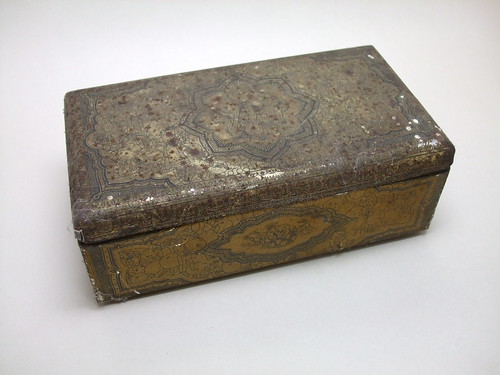I have a bit of a dilemma. In StarMark, there's a box:
 |
| A bit like this one. |
The box contains a few items of sentimental value. Their stories can never be told because the owner of the box has died. The reader will 'look' inside this box very early on in the story and 'see' the objects. However, there is one item 'seen' at this point whose significance is revealed much later.
This is a deliberate ploy on my part as the writer: to apparently reveal everything from the start. But recent comments have forced me to rethink whether a big reveal up front is the best way to handle this particular situation.
So - as a reader - would you be disappointed that you'd seen everything straight off? And if you were disappointed initially, would you feel better when the 'Aha!' reveal moment occurred? Or, would you prefer to keep dipping into the box to see a little bit more each time? Prolong the suspense of the reveal?
Thanks in advance for your thoughts.
Well, as you know, Squidge, suspense is what makes a reader keep on reading...is there any chance that it turns out that there is a secret compartment in the box - which the other objects discretely refer to and further add to the intrigue.
ReplyDeleteOoh, if we were playing hide-and-seek, you'd be warm, Baz! Can't say too much more though...
DeleteMmmm. It is a tricky one. I'd prefer to be drip fed and enjoy the big reveal at the end. BUT you could 'bury' the biggy in a list of throw-away red-herrings which might be pretty or have slight meaning - break a few rules!
ReplyDeleteSo are you, Abi!
DeleteI like both of the above ideas.
ReplyDeleteProlonged suspense always draws me deeper into the story.
What keeps the reader reading is what they don't know, so perhaps hints along the way with the 'odd' reveal to move the story on, leading to a satisfying ending?
ReplyDeleteI might be a bit slow but I don't see the problem. Aren't you doing what Abigail is referring to? Showing all the objects in the box as though they didn't have much significance, then one of them ends up being really significant, like a Chekhov's gun kind of thing?
ReplyDeleteBut to answer your question, I quite like having guessed stuff before it happens, but not being really sure either. Makes me feel clever ;) I find that's different from something being predictable (one is exciting, the other isn't), but it doesn't sound from what you're saying that your plot is predictable.
I can't see much wrong with your initial premise, katherine. If undue attention isn't focussed on the significant object, then when its significance becomes apparent, the reader can say, 'a-ha!' Although I realise that this does nothing to help you with your decision...
ReplyDeleteStevie (Mark)
It depends how you 'show' them all. I would rather be given the impression I had been told everything important and left with the assumption nothing in the box was worthy of much thought, which means the MC telling it as though that is the case. I would also rather it was a fairly brief mention in the first place, or I will wonder why time is being taken over it and that will not quite work. Or, I would like one object to seem to be the important one and the others briefly recorded and set aside, and then the seemingly important one mentioned in the MC's thoughts whenever she reflects, to throw me off. From her POV, we 'know' what is important. But we also have not been lied to. We have seen the key object. We have just been misdirected.
ReplyDeleteI would then want further hints as to which object is really key as we go, we essentially my answer is, as I said elsewhere, both.
I think it is as much in how you write the reveal as in when the reveal happens or how much we 'see' of the physical objects.
Thanks everyone for the input so far. I can certainly bring up the subject of the box later in the story, before the big reveal to prolong the suspense. Think I'd be happier doing that than dipping into the box several times to prolong showing the reader exactly what's in it.
ReplyDeleteShell - interesting thought - to pick out an object that might appear to be significant but isn't...I had to take a letter out of the box, because readers wanted to know what it said; I realised it was a terrible red herring because it was just something in the box and had no importance whatsoever.
Lots of food for thought here...
I agree with Shell. Definitely a bit of both. I think its nice to be given a bit of information so the reader can guess the secret or the importance of an object. The we can feel smug when the big reveal happens and we can say I told you so.
ReplyDeleteI think you can do it either way but most importantly, when you do the big reveal, there has to be markers along the way so that it doesn't come completely out of nowhere otherwise the reader ends up feeling cheated....like in murder mysteries where you are offered various suspects all with good motives and then right at the end the murderer is revealed to be someone who appeared for a brief cameo in chapter 2 never to be heard of again until it turned out they did it. Very frustrating and a bit of a cheat! So whatever you decide, it has to all point towards the big reveal, however subtly, so that the reader either says "I knew it!" or slaps their forehead and says "how didn't I see that?!"
ReplyDelete